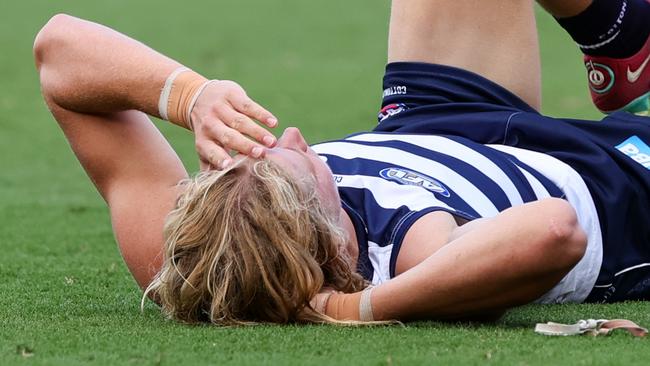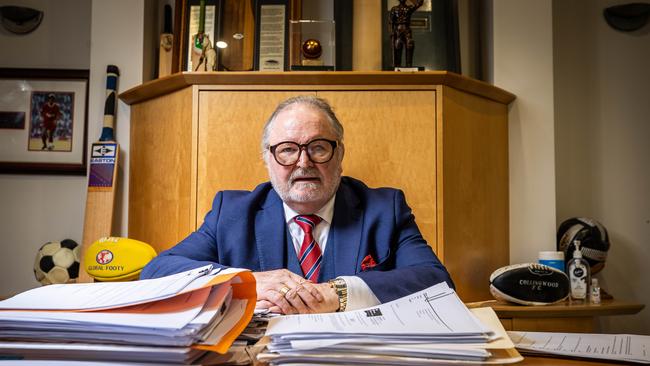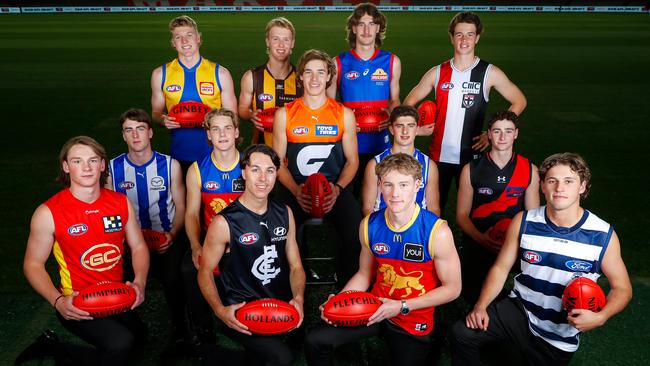Key reforms pushed to curb AFL’s concussion epidemic
With 17 current AFL players in the concussion “red zone,” major reforms have once again been put to the AFL in the hopes of curbing the concussion epidemic. See the list of players here.
AFL
Don't miss out on the headlines from AFL. Followed categories will be added to My News.
Vision training and neck strengthening exercises could help the AFL curb its concussion epidemic as pressure mounts on the league to “reset” the science and medicine responsible for its under-fire protocols.
It can be revealed a nine-step plan adapted from the model that slashed concussions at Cincinnati University by 80 per cent was emailed to league chiefs two years ago.
The Herald Sun yesterday revealed that AFL clubs were pushing for concussion passports, which would serve as the first step of the plan aimed at modernising the AFL’s approach.
The reform would see the season shortened, full contact banned in pre-season games and players ordered to undergo mandatory counselling after their third clinical concussion.
At least 17 current players have entered the red zone – suffering three clinical concussions in the past three seasons – including premiership Cats Sam De Koning, Jed Bews and Jake Kolodjashnij.
It’s believed some clubs including Carlton already integrate neck strengthening into their training.
Concussion activist Peter Jess sent the nine-step plan to the AFL but said they did not respond.
The AFL on Monday said its annual concussion protocols review was underway.
“The AFL’s concussion protocols have been developed on the advice of qualified medical, concussion and scientific experts on the AFL Concussion Scientific Committee,” the league said.

“We respect that everyone is entitled to a view, however we will continue to base the continued evolution of these protocols and ultimately the continued health and safety of our players on the advice and guidance of qualified medical professionals and scientific experts having considered recent research of concussion and head trauma.”
Jess claimed men’s clinical concussions had grown from 103 (2021) to 118 (2022) and 122 (2023) – grading the AFL’s approach a “total fail”.
Jess took aim at chief medical official Michael Makdissi, departed chief executive Gillon McLachlan and AFL chairman Richard Goyder.
“By them adopting their current protocols it’s led to over 50 young men in the last 10 years retiring prematurely from concussion,” Jess said.
“In my view, Makdissi must consider his position at the AFL. Under his watch year on year the clinical concussions have increased.”
Makdissi is highly-respected at AFL headquarters and by chief executive Andrew Dillon, as well as by clubs.
A fresh position report from The Royal College of Pathologists of Australasia states that CTE is dose-related.
“These are the people that actually look at the brains of people who have died from CTE,” Jess said.
“Exposure from collision-based sport will create a causal relationship, which will then lead to CTE. It says that year on year there is a 14 per cent increase in the likelihood of you getting CTE.
“They’ve confirmed the youngest case is 20 years old. We’ve been stuck in this paradigm that it’s only the professional sports that are in trouble – it’s not.
“It is a community-based pandemic.
“If mums and dads knew you had a 68 per cent chance of having brain damage, no matter what level of men’s or women’s football you play, and there was no mitigation strategy.”
Jess said CTE was a “preventable disease if proper preventive and mitigation strategies” are enacted.
“But the AFL and the AFLPA have not undertaken those strategies to the detriment of hundreds if not thousands of participants at every level,” Jess said.
“The more you play, the longer you play, the greater brain damage to the playing cohort year on year. “
Jess emailed the findings from a collaboration between the University of Glasgow, Boston University and the University of Sydney laboratories — which found new evidence linking playing rugby to CTE — to AFL boss Andrew Dillon on November 3.
“The measures of prevention and mitigation of CTE risk must be implemented before the 2024 pre-season,” Jess wrote to Dillon.
Plan to stop draft prospects from hiding concussions
The concerning concussion history of several top prospects looms as a wildcard in next week’s AFL draft as clubs push for the implementation of a concussion passport.
That passport would be activated as soon as a junior began playing full contact sport and would later allow clubs to consider the state of a player’s brain before being drafted.
An independent medical body conducting biomarkers would also be able to detect when a player has attempted to cover up a concussion.
Almost one in 10 AFL players admitted they hid a concussion last year and recruiters fear it is happening in junior football.
“They’re probably not going to self-report because it might limit their chances of getting a job,” one club’s AFL recruiter said.
Certain No. 1 pick Harley Reid sat out five weeks after suffering a concussion in May while top-30 ruck prospect Mitch Edwards returned 16 days after his mid-season blow.
Some clubs believe Western Bulldogs-bound father-son Croft has suffered as many as seven head knocks – but were unsure how many of those resulted in concussion.
Those close to Croft are adamant he has only one concussion, from 2021.
While those examples are widely known, the Herald Sun has learned of several other prospects with one or two known concussions.

Concussion campaigner Peter Jess said the careers of retired No. 1 pick Paddy McCartin and Nathan Murphy – who each had five clinical concussions before being drafted – demonstrated the risk in selection a player with a history of head knocks.
While McCartin and Murphy’s issues were known, Jess and clubs suspect players with similar journeys are been drafted blindly.
“If you’re going to invest millions in somebody, wouldn’t you want to know that you’re not buying damaged goods?” Jess said.
“You go and test drive a car to see if it’s got any problems. We’ve got too many guys that have fallen through the cracks in the system — 50 young men have had to retire prematurely in the last 10 years (due to concussion).
“If you were going to use a top-10 draft pick you would want the brain scan.”
Jess’s clients Joel Jeffrey (Gold Coast) and Amy Smith (North Melbourne) underwent the world-best MEG scan before they were drafted, providing a biomarker baseline used to track damage annually.

Recruiters said it was up to their club doctor to rule a draft prospect out on medical grounds.
“Concussion has never been so important and spoken about more than over the last year or two,” one club said.
“Because a lot of it is self-reporting there’s vagueness around it. It’s definitely been mentioned this year more than ever.”
That vagueness, as well as the confusion around, for example, Croft, has clubs certain that concussion passports would help them make better-informed decisions.
“As clubs we rely on the AFL – they’re a shared supplier of this (medical) information,” one club said.
“So we’re relying on their protocols to help us make decisions. So if it’s not correct, then it’s not great for clubs.
“The key factor in recruiting is relying on accurate information to make an informed investment.
“If the information is not accurate then there’s a high risk for failure.”
Originally published as Key reforms pushed to curb AFL’s concussion epidemic


